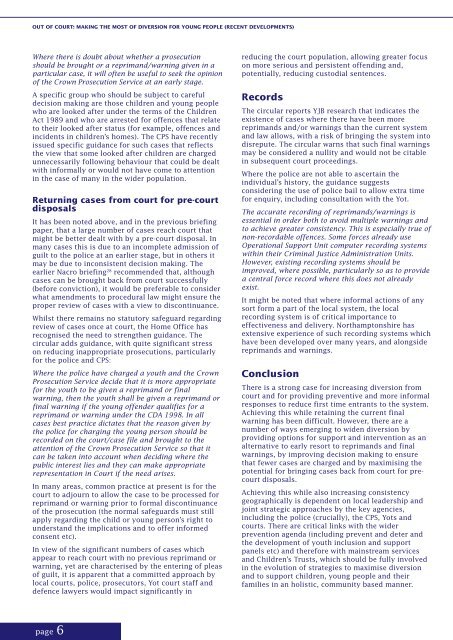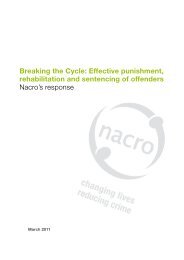Youth Crime briefing - Nacro
Youth Crime briefing - Nacro
Youth Crime briefing - Nacro
Create successful ePaper yourself
Turn your PDF publications into a flip-book with our unique Google optimized e-Paper software.
Out of court: making the most of diversion for young people (recent developments)Where there is doubt about whether a prosecutionshould be brought or a reprimand/warning given in aparticular case, it will often be useful to seek the opinionof the Crown Prosecution Service at an early stage.A specific group who should be subject to carefuldecision making are those children and young peoplewho are looked after under the terms of the ChildrenAct 1989 and who are arrested for offences that relateto their looked after status (for example, offences andincidents in children’s homes). The CPS have recentlyissued specific guidance for such cases that reflectsthe view that some looked after children are chargedunnecessarily following behaviour that could be dealtwith informally or would not have come to attentionin the case of many in the wider population.Returning cases from court for pre-courtdisposalsIt has been noted above, and in the previous <strong>briefing</strong>paper, that a large number of cases reach court thatmight be better dealt with by a pre-court disposal. Inmany cases this is due to an incomplete admission ofguilt to the police at an earlier stage, but in others itmay be due to inconsistent decision making. Theearlier <strong>Nacro</strong> <strong>briefing</strong> 28 recommended that, althoughcases can be brought back from court successfully(before conviction), it would be preferable to considerwhat amendments to procedural law might ensure theproper review of cases with a view to discontinuance.Whilst there remains no statutory safeguard regardingreview of cases once at court, the Home Office hasrecognised the need to strengthen guidance. Thecircular adds guidance, with quite significant stresson reducing inappropriate prosecutions, particularlyfor the police and CPS:Where the police have charged a youth and the CrownProsecution Service decide that it is more appropriatefor the youth to be given a reprimand or finalwarning, then the youth shall be given a reprimand orfinal warning if the young offender qualifies for areprimand or warning under the CDA 1998. In allcases best practice dictates that the reason given bythe police for charging the young person should berecorded on the court/case file and brought to theattention of the Crown Prosecution Service so that itcan be taken into account when deciding where thepublic interest lies and they can make appropriaterepresentation in Court if the need arises.In many areas, common practice at present is for thecourt to adjourn to allow the case to be processed forreprimand or warning prior to formal discontinuanceof the prosecution (the normal safeguards must stillapply regarding the child or young person’s right tounderstand the implications and to offer informedconsent etc).In view of the significant numbers of cases whichappear to reach court with no previous reprimand orwarning, yet are characterised by the entering of pleasof guilt, it is apparent that a committed approach bylocal courts, police, prosecutors, Yot court staff anddefence lawyers would impact significantly inreducing the court population, allowing greater focuson more serious and persistent offending and,potentially, reducing custodial sentences.RecordsThe circular reports YJB research that indicates theexistence of cases where there have been morereprimands and/or warnings than the current systemand law allows, with a risk of bringing the system intodisrepute. The circular warns that such final warningsmay be considered a nullity and would not be citablein subsequent court proceedings.Where the police are not able to ascertain theindividual’s history, the guidance suggestsconsidering the use of police bail to allow extra timefor enquiry, including consultation with the Yot.The accurate recording of reprimands/warnings isessential in order both to avoid multiple warnings andto achieve greater consistency. This is especially true ofnon-recordable offences. Some forces already useOperational Support Unit computer recording systemswithin their Criminal Justice Administration Units.However, existing recording systems should beimproved, where possible, particularly so as to providea central force record where this does not alreadyexist.It might be noted that where informal actions of anysort form a part of the local system, the localrecording system is of critical importance toeffectiveness and delivery. Northamptonshire hasextensive experience of such recording systems whichhave been developed over many years, and alongsidereprimands and warnings.ConclusionThere is a strong case for increasing diversion fromcourt and for providing preventive and more informalresponses to reduce first time entrants to the system.Achieving this while retaining the current finalwarning has been difficult. However, there are anumber of ways emerging to widen diversion byproviding options for support and intervention as analternative to early resort to reprimands and finalwarnings, by improving decision making to ensurethat fewer cases are charged and by maximising thepotential for bringing cases back from court for precourtdisposals.Achieving this while also increasing consistencygeographically is dependent on local leadership andjoint strategic approaches by the key agencies,including the police (crucially), the CPS, Yots andcourts. There are critical links with the widerprevention agenda (including prevent and deter andthe development of youth inclusion and supportpanels etc) and therefore with mainstream servicesand Children’s Trusts, which should be fully involvedin the evolution of strategies to maximise diversionand to support children, young people and theirfamilies in an holistic, community based manner.page
















